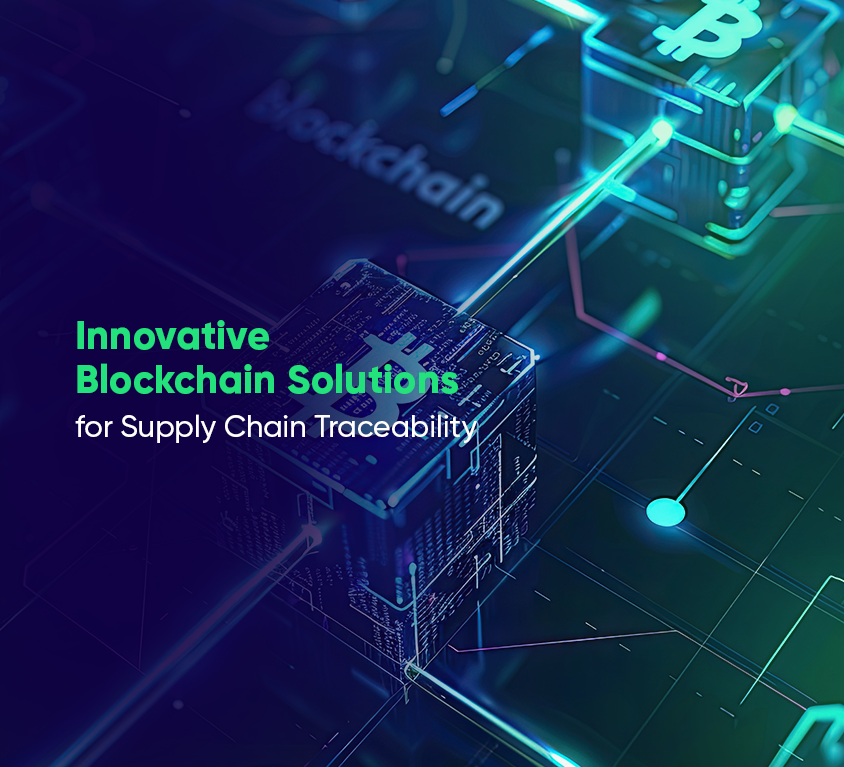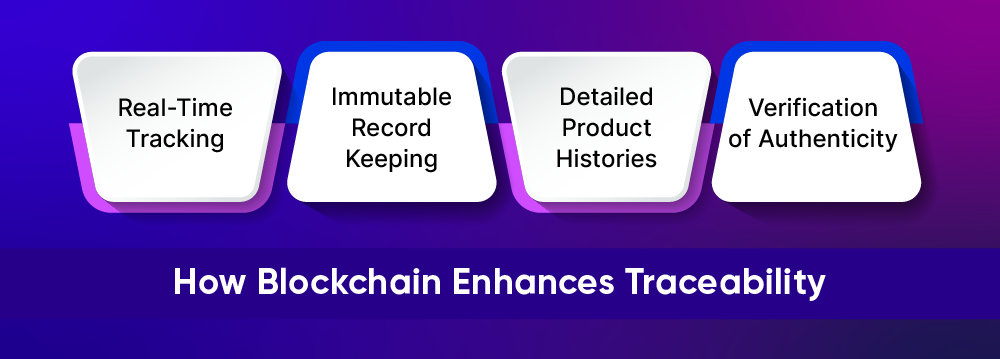
Introduction
Blockchain & Web3 Services Trusted By Leaders
- Develop innovative solutions using our state-of-the-art blockchain expertise.
- Achieve accelerated growth with robust & scalable Web3 consulting.
- Unlock 360-degree security with our top-rated blockchain development.
Innovative Blockchain Solutions for Supply Chain Traceability
Supply chains are the lifelines of our global economy, however, they are complex mazes that span continents and involve countless participants. These sprawling networks are prone to numerous problems, such as delays, wasted goods, and fraud. In today’s era where efficiency and authenticity are important, the need for greater transparency and reliability in tracking supply chain activities has never been more urgent. Blockchain technology, primarily known for its application in cryptocurrencies like Bitcoin, presents a powerful solution to enhance traceability and ensure transparency in these networks.Key Takeaways
- Blockchain technology ensures each transaction or movement within the supply chain is recorded, visible, and unalterable.
- The immutable nature of blockchain records every step of a product’s journey in real time, making it easier to track and verify the origins.
- The detailed and accessible records provided by blockchain make it simpler for companies to comply with regulatory requirements and conduct audits.
- Blockchain adoption in SCM is expected to grow, further changing the industry by providing more robust solutions to longstanding challenges.
Understanding Blockchain Technology
Blockchain technology is revamping the way we track and verify transactions in supply chains, ensuring unparalleled levels of traceability. Blockchain, at its core, serves as a decentralized digital ledger that records every transaction across a network of computers, making it secure and immutable. This technological innovation is particularly crucial in supply chain management, where every stage of the journey, from production to delivery, requires in-depth oversight.Current Challenges in Supply Chain Management
Supply chains, critical to the flow of goods around the world, are often hindered by a range of challenges that can compromise efficiency, security, and compliance. These challenges not only disrupt operations but can also have significant economic and reputational impacts on businesses.Delays & Inefficiencies
A major challenge within modern supply chains is the frequent delays and inefficiencies that occur due to the lack of real-time data. In a typical supply chain, goods move through multiple checkpoints and international borders, requiring various documentation and approvals. Without access to real-time information, it’s difficult for businesses to predict arrival times or manage inventory effectively. This lack of visibility can lead to excessive stock holding costs, insufficient use of assets, and missed delivery deadlines, all of which are detrimental to operational efficiency and customer satisfaction.Counterfeiting
Counterfeiting is a global issue costing industries billions of dollars annually. In sectors such as pharmaceuticals, electronics, luxury goods, and automotive parts, fake products not only lead to revenue loss but also pose serious risks to consumer safety and brand reputation. Traditional tracking systems often lack the security features necessary to verify authenticity at every stage of the supply chain. As a result, counterfeit goods can slip through gaps in the tracking process, entering the market as seemingly legitimate products.Compliance Challenges
Regulatory compliance is another significant challenge for global supply chains. Products must adhere to various local, national, and international regulations that can differ widely from one region to another. Ensuring compliance requires thorough documentation and tracking of products throughout their lifecycle, from production to delivery. However, without a reliable tracking system, proving compliance can be cumbersome and prone to errors. Non-compliance can lead to heavy fines, product recalls, and damage to company’s reputation.How Blockchain Enhances Traceability?

Real-Time Tracking
Blockchain enables the real-time tracking of goods as they move through the supply chain. Each transaction recorded on the blockchain reflects a transfer of goods, updating the status immediately across all nodes. This allows all stakeholders to track the progress of goods in near real-time, enhancing responsiveness to any supply chain disruptions or demands.Immutable Record Keeping
Once a product’s data is entered on a blockchain, it cannot be altered or deleted. This immutability guarantees that the product history is preserved securely, making it easy to trace origins and movements without fear of data tampering.Detailed Product Histories
From the moment raw materials are sourced until the final product reaches the consumer, each step can be documented on the blockchain. This includes information about manufacturing dates, batch numbers, expiration dates, storage temperatures, and shipping details. For industries like pharmaceuticals and perishables, this level of detail is crucial for compliance and safety.Verification of Authenticity
Blockchain facilitates the verification of product authenticity. Consumers and stakeholders can view the entire history of the product, confirming that it meets all standards and regulations required by law and industry. This is particularly useful in combating counterfeit products in sectors like luxury goods, electronics, and pharmaceuticals.Impact of Enhanced Traceability
The enhanced traceability provided by blockchain can significantly reduce costs related to reverse logistics and recalls because products can be traced back to their source quickly and accurately. This capability is critical in cases of contamination, defects, or compliance failures. Moreover, by providing a transparent view of the supply chain, blockchain builds trust among consumers and reinforces brand integrity.Real-World Applications of Blockchain In Supply Chain
Many companies across various industries are exploring blockchain for supply chain management:- Walmart: The retail giant uses blockchain to track the origin of over 25 products from 5 different suppliers. This initiative helps them manage recalls more effectively and improve consumer safety.
- De Beers: De Beers employs blockchain to trace diamonds from the mine to the retail points, ensuring that the diamonds are ethically sourced and not tampered with throughout the process.
Considerations for Implementing Blockchain Solutions
When adopting blockchain solutions, supply chain organizations need to take into account various technical, operational, and strategic aspects. Here are some key factors to consider:- Scalability: Blockchain technology often handles large amounts of data that need extensive computing power for processing and storage. Organizations should plan how to expand their blockchain solutions to accommodate future growth.
- Interoperability: To implement blockchain throughout the supply chain, it’s important to ensure it works smoothly with different systems and platforms. Organizations need to tackle any compatibility issues between their current systems and new blockchain solutions.
- Data Privacy: Although blockchain is known for its openness and unchangeable nature, this can lead to data privacy concerns. Organizations must figure out how to protect privacy while maintaining the transparency and reliability of their blockchain systems.
Challenges in Implementing Blockchain Solutions
Integrating blockchain technology into supply chain management comes with several obstacles that organizations need to address. Here are some of the main challenges:- Cost: Setting up blockchain solutions requires a substantial financial outlay for technology, training, and staff. Organizations need to weigh these costs against the anticipated benefits and return on investment.
- Regulatory Hurdles: The legal framework surrounding blockchain is still evolving, with different regions and sectors having diverse regulations. Organizations must carefully navigate these regulatory environments to ensure they remain compliant.
- Resistance to Change: Adopting blockchain technology involves significant shifts in how things are traditionally done, which might not be readily accepted by everyone. Organizations should manage this resistance by providing adequate training and support to facilitate a smooth transition.